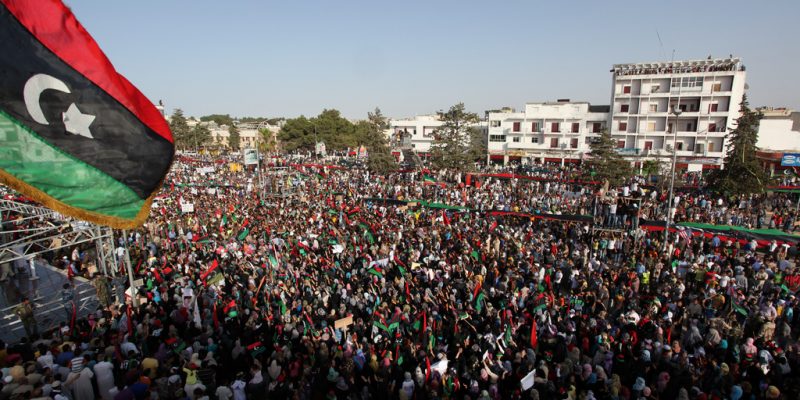1. We really need to talk about Libya
What is happening in Libya, and what are the consequences of the Italian and EU policies in the African country and at sea? To learn more on the critical area of the Central Mediterranean route, read Daniel Howden’s extensive report in Refugees Deeply, based on the research by journalist Nancy Porsia, with photographs by Alessio Romenzi.
Also read Annalisa Camilli’s article in Internazionale on the fragile peace process and article by Francesca Mannocchi published last September in L’Espresso on the war of militias in Sabratha.
PS We will be talking about Libya with Nancy Porsia during a special Open Migration event on Wednesday October, 11 at the Casa della Carità in Milan. Don’t miss it!
2. Europe slams its gates: the consequences
Also focusing on Libya – as well as Mali, Niger, Senegal and Germany – a five-part special investigation in Foreign Policy on the EU policies in Africa and the disastrous consequences for the African continent and Europe itself. An essential read.
3. The shipwreck of October 11, 2013, told in a movie
On October 11, 2013, a boat loaded with nearly 500 Syrian refugees (including nearly 150 children) was fired upon by Libyan patrol vessels and began taking on water. A series of desperate calls for assistance followed, with the Italian Navy delaying intervention, until the boat eventually sank and 268 (60 of them children) lost their lives.
On October 27, the court will decide on the closing of the case. Meanwhile, Fabrizio Gatti – who had first documented the phone calls during the “children’s shipwreck” – made an exclusive feature film for La Repubblica and L’Espresso, exposing the hidden truths on the massacre in the Mediterranean four years ago. Ahead of the release on October 15th, L’Espresso has published an interview with a key witness. Also read the article by Pietro Barabino in Il Fatto Quotidiano.
4. Ventimiglia, rights on the border
A new Refugee Rights Data report sheds light on the migrants stranded at the French border near Ventimiglia, documenting the desperate living conditions and the systematic violations of human rights. Also read the first part in our investigation on border deaths.
5. Deadly new routes
A route is closed, another route opens, or many. With an increasingly dangerous Libyan route in the Central Mediterranean, the Algerian route becomes once again an option for undocumented migrants heading for Italy, Lorenzo Bagnoli wrote in Il Fatto Quotidiano. Meanwhile, in Tunisia, more and more young people are leaving in the attempt to reach Italy at all costs: read the article by Niccolò Zancan in La Stampa.
6. What will happen to the Dreamers?
Officially, the Deferred Action for Childhood arrivals programme, created by Obama to ensure unauthorized immigrants who came to the US as children of teenagers would receive protection from deportation and work permits, ends on March 5, 2018. In practice, the doors were shut last week: the administration suddenly announced an October 5 deadline to submit renewal requests. What is worse, the administration didn’t notify “Dreamers” about the deadline, and despite the advocates’ best efforts, less than 15.000 applications came in with one day to go. Read Dara Lind’s in-depth analyses in Vox on the deadline for renewals and the actual number of immigrants who have DACA, as well as our own explainer on the importance of DACA.
7. Back to Afghanistan – what next?
EU countries, Pakistan and Iran are still sending Afghan refugees back to their country. What consequences will these deportations have in a war-torn Afghanistan, still a long way from stability. Ali M. Latifi denounced in Think Progress the violence and discrimination facing the “returnees”, Preethi Nallu wrote in Refugees Deeply about the cycle of displacement, Anna Shea reported in Time on the concerns of human rights organisations (such as Amnesty, which has repeatedly stated that Europe is betraying refugees).
8. We cannot ignore the genocide of the Rohingya
A textbook ethnic cleansing (the UN described it thus) is underway in Myanmar, which is forcing more than half a million members of the Rohingya community to flee in despair. Very little is being told, however, of this tragic situation. Poppy McPherson’s article in Refugees Deeply reports on the difficulties of escaping Myanmar alive, while e Tom Felix Joehnk’s op-ed in the New York Times analyses how the arrival of hundreds of thousands of refugees in Bangladesh is about to change the country forever. On the BBC website, Anbarasan Ethirajan writes about the story not being talked about in Myanmar.
9. The 50th anniversary of the Geneva Protocol, and its crisis
Fifty years ago, the Geneva Protocol Relating to the Status of Refugees entered into force, giving a universal basis to the international protection of refugees, without limit of time or place.
On the 50th anniversary of the protocol, here are some thoughts by Professor Guy Goodwin-Gill for Refugees Deeply on the state of the art and why the current policies – especially Australia’s – are endangering the fundamental principles enshrined in the Protocol. Also read Elaine Person’s article for Al Jazeera on refugees in Australia
10. The eBay of family tracing
With 65 million forcibly displayed people in the world, the issue of family reunion has become a global emergency. How to trace and bring together the thousands of people who were separated from their loved ones during forced migrations? Enter Refunite, an organisation that seeks to become “the eBay of family tracing”. Read Tina Rosenberg’s article in the New York Times.
Translation by Francesco Graziosi.
Cover photo via Wikimedia.









